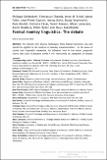Files in this item
Formal monkey linguistics : the debate
Item metadata
| dc.contributor.author | Schlenker, Philippe | |
| dc.contributor.author | Chemla, Emmanuel | |
| dc.contributor.author | Schel, Anne M. | |
| dc.contributor.author | Fuller, James | |
| dc.contributor.author | Gautier, Jean Pierre | |
| dc.contributor.author | Kuhn, Jeremy | |
| dc.contributor.author | Veselinović, Dunja | |
| dc.contributor.author | Arnold, Kate | |
| dc.contributor.author | Cäsar, Cristiane | |
| dc.contributor.author | Keenan, Sumir | |
| dc.contributor.author | Lemasson, Alban | |
| dc.contributor.author | Ouattara, Karim | |
| dc.contributor.author | Ryder, Robin | |
| dc.contributor.author | Zuberbühler, Klaus | |
| dc.date.accessioned | 2017-07-05T23:33:52Z | |
| dc.date.available | 2017-07-05T23:33:52Z | |
| dc.date.issued | 2016-07-05 | |
| dc.identifier | 244781959 | |
| dc.identifier | 9ee81473-ef00-47e7-9734-af0033c71486 | |
| dc.identifier | 84978393913 | |
| dc.identifier | 000379522600010 | |
| dc.identifier.citation | Schlenker , P , Chemla , E , Schel , A M , Fuller , J , Gautier , J P , Kuhn , J , Veselinović , D , Arnold , K , Cäsar , C , Keenan , S , Lemasson , A , Ouattara , K , Ryder , R & Zuberbühler , K 2016 , ' Formal monkey linguistics : the debate ' , Theoretical Linguistics , vol. 42 , no. 1-2 , pp. 173-201 . https://doi.org/10.1515/tl-2016-0010 | en |
| dc.identifier.issn | 0301-4428 | |
| dc.identifier.other | ORCID: /0000-0001-8378-088X/work/64360761 | |
| dc.identifier.uri | https://hdl.handle.net/10023/11155 | |
| dc.description.abstract | We explain why general techniques from formal linguistics can and should be applied to the analysis of monkey communication - in the areas of syntax and especially semantics. An informed look at our recent proposals shows that such techniques needn't rely excessively on categories of human language: syntax and semantics provide versatile formal tools that go beyond the specificities of human linguistics. We argue that "formal monkey linguistics" can yield new insights into monkey morphology, syntax, and semantics, as well as raise provocative new questions about the existence of a pragmatic, competition-based component in these communication systems. Finally, we argue that evolutionary questions, which are highly speculative in human language, can be addressed in an empirically satisfying fashion in primate linguistics, and we lay out problems that should be addressed at the interface between evolutionary primate linguistics and formal analyses of language evolution. | |
| dc.format.extent | 29 | |
| dc.format.extent | 1901884 | |
| dc.language.iso | eng | |
| dc.relation.ispartof | Theoretical Linguistics | en |
| dc.subject | Call evolution | en |
| dc.subject | Evolution of language | en |
| dc.subject | Evolutionary primate linguistics | en |
| dc.subject | Primate linguistics | en |
| dc.subject | Primate semantics | en |
| dc.subject | Primate syntax | en |
| dc.subject | QH301 Biology | en |
| dc.subject | BF Psychology | en |
| dc.subject | Language and Linguistics | en |
| dc.subject | Linguistics and Language | en |
| dc.subject | NDAS | en |
| dc.subject.lcc | QH301 | en |
| dc.subject.lcc | BF | en |
| dc.title | Formal monkey linguistics : the debate | en |
| dc.type | Journal article | en |
| dc.contributor.institution | University of St Andrews. School of Psychology and Neuroscience | en |
| dc.contributor.institution | University of St Andrews. Institute of Behavioural and Neural Sciences | en |
| dc.contributor.institution | University of St Andrews. Centre for Social Learning & Cognitive Evolution | en |
| dc.identifier.doi | https://doi.org/10.1515/tl-2016-0010 | |
| dc.description.status | Peer reviewed | en |
| dc.date.embargoedUntil | 2017-07-05 |
This item appears in the following Collection(s)
Items in the St Andrews Research Repository are protected by copyright, with all rights reserved, unless otherwise indicated.

